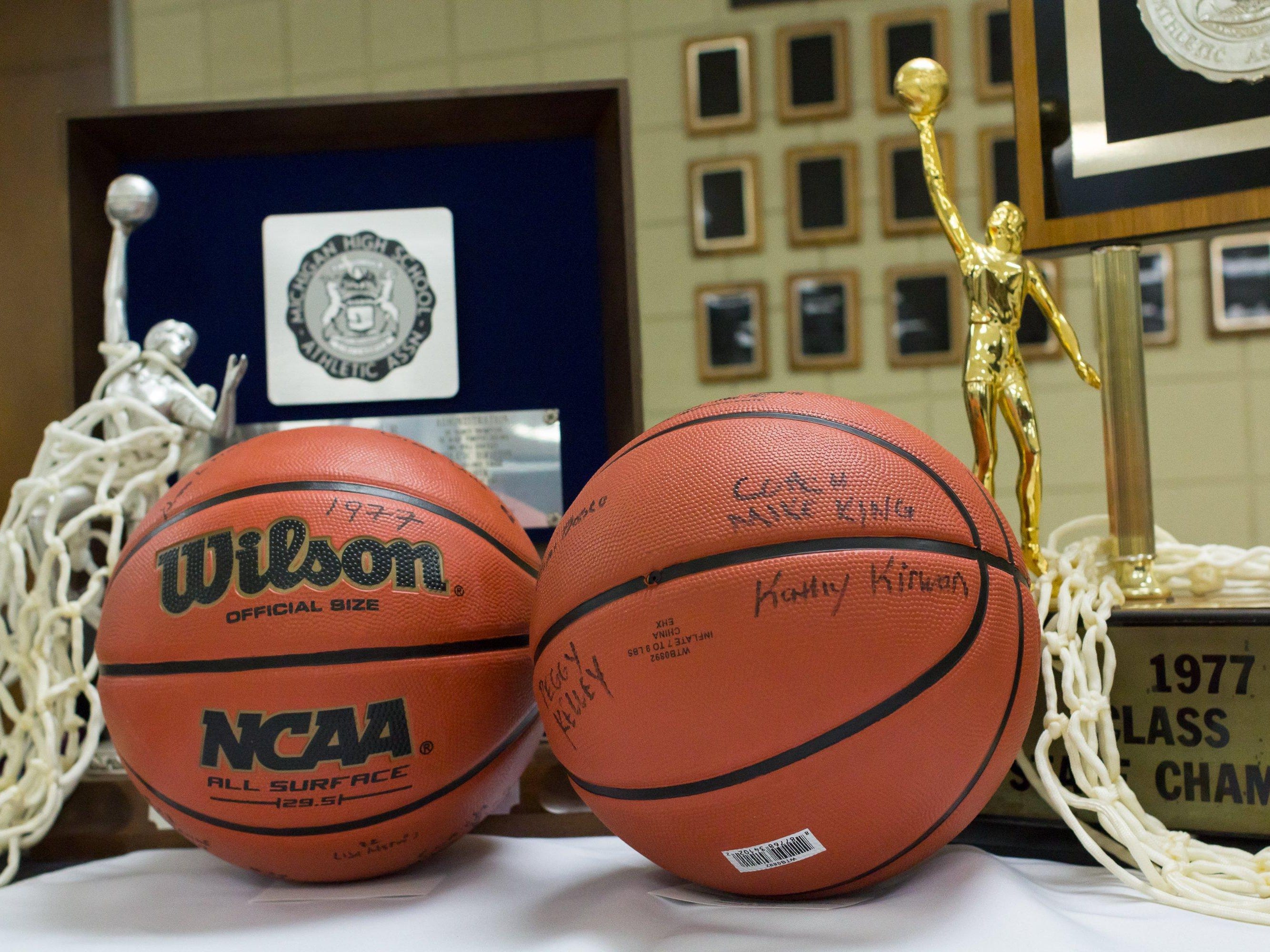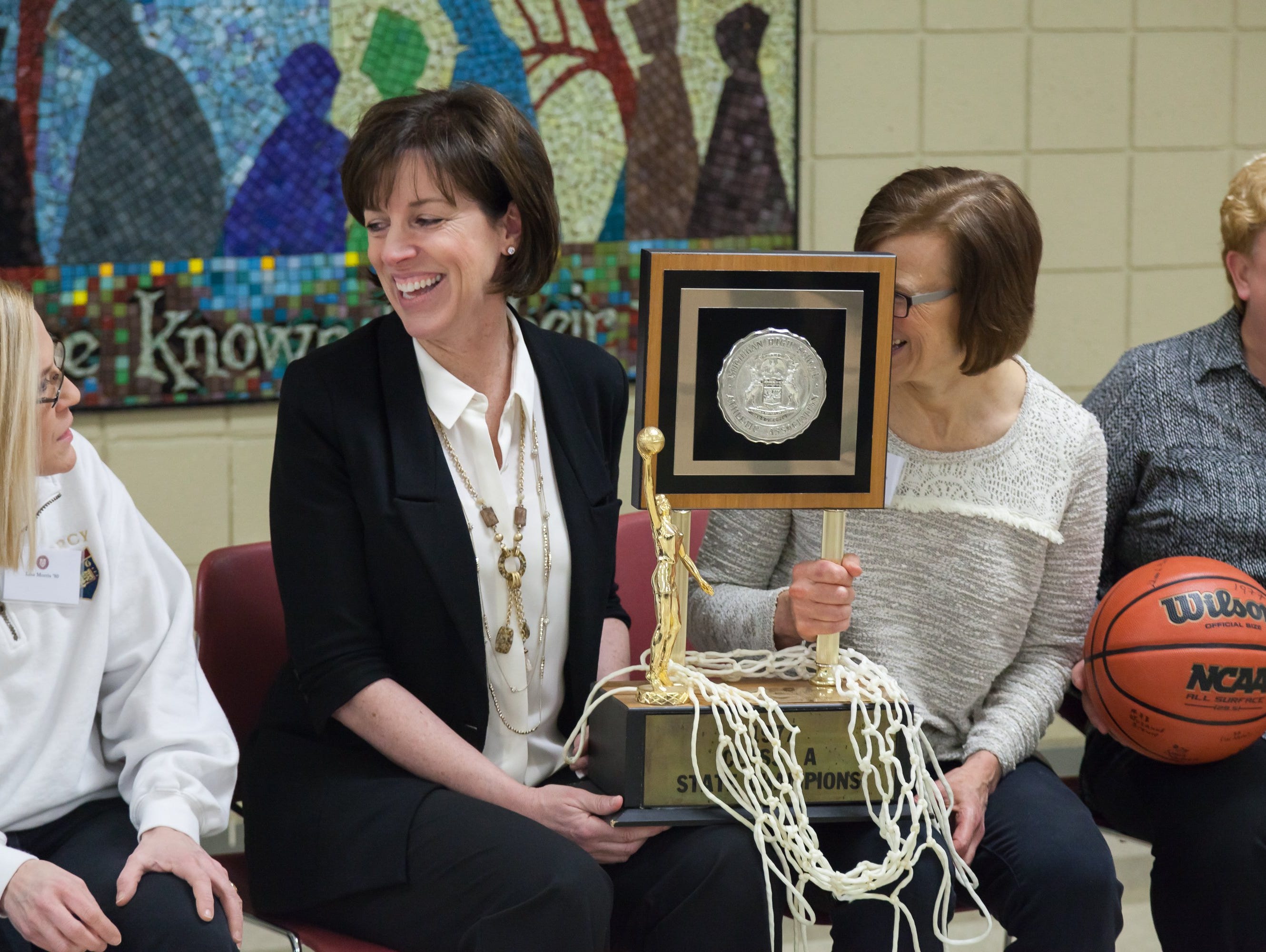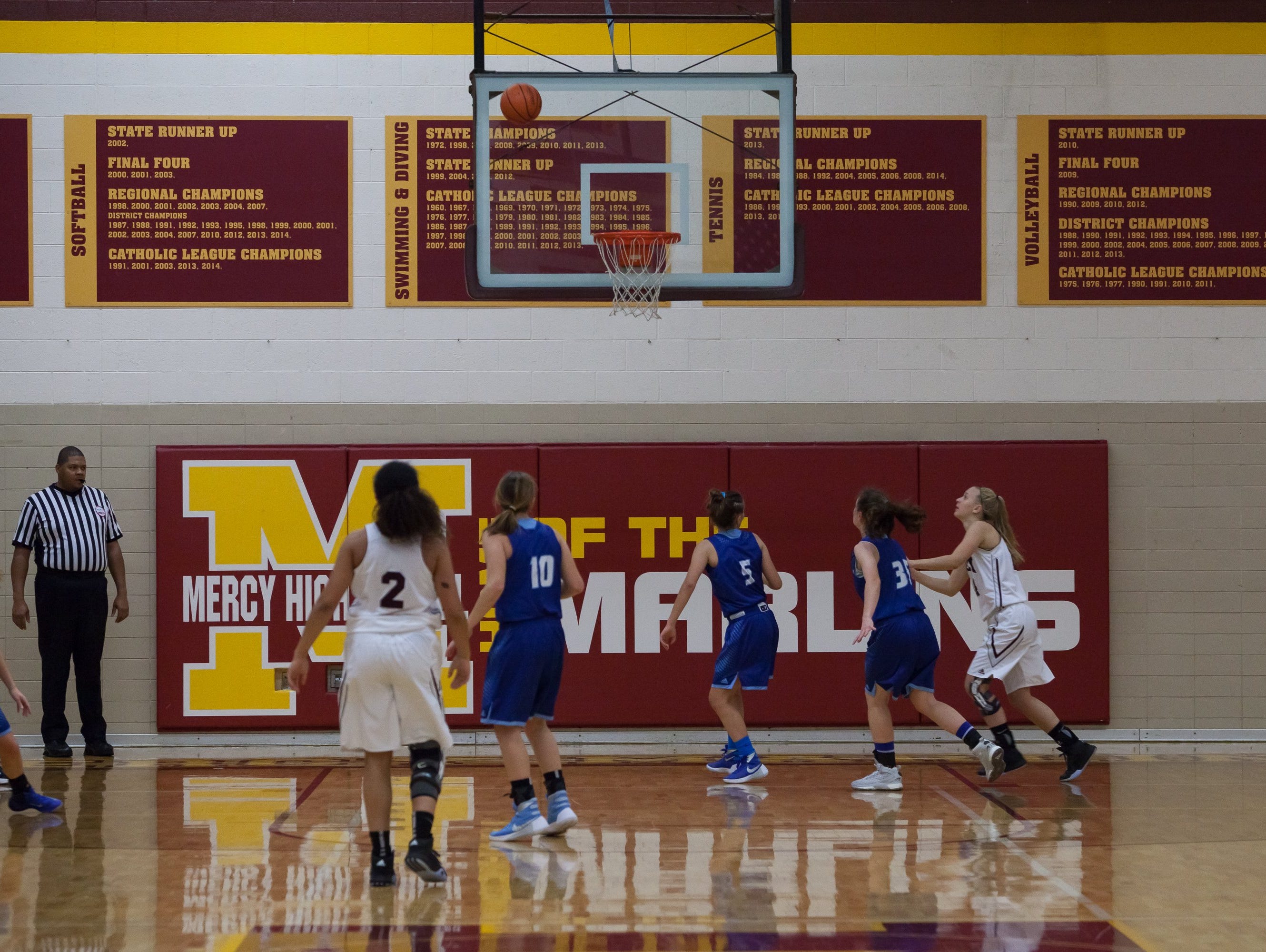
The trophies from Farmington Hills Mercy’s 1977 and 1982 girls basketball state championships were on display Jan. 8 for a reunion of the two teams at the school.
There they were, standing on the basketball court at Farmington Hills Mercy last Friday, the same court where it all began oh so many years ago.
On one side were many of the former players who comprised one of the greatest girls basketball teams in state history.
On the other side were some of the players who were part of one of the state’s most unlikely championship teams.
The ties that bond them were that court and former head coach Larry Baker and assistant coach Mike King, who oversaw both Class A state championship teams in 1977 and 1982.
It was a time when girls basketball was played in the fall and the game as we know it today was in its infancy.
“Only a few years before my freshman year they were playing six-man,” said Lynn Yadach-Blakey, who played on the ’77 team. “And the defense couldn’t cross over to the offense.”
Before it dawned on the rules-makers that girls were physically able to play full court basketball like the boys, girls used six players at a time, but no one was permitted to cross half court. Eventually the game designated one player as the “rover,” who was permitted to play full court.
The 5-on-5 game was well under way when freshmen Yadach-Blakey, Diane Dietz and Katie McNamara were called up to the Mercy varsity for the end of the 1974 season, which resulted in a 59-58 finals loss to Detroit Dominican in the second year of the Michigan High School Athletic Association state tournament.
A year later, the Marlins advanced to the championship game again — and lost to Detroit Northeastern, 67-62.
The 1976 season brought junior point guard Suzanne Brown to Mercy, where her aunt, Sr. Mary Timothy Brown, was vice-principal in charge of discipline.
It was a rude awakening for Brown.
“When I came here I was the best player coming out of Saginaw Arthur Hill,” she said. “When I got here it was a struggle because I was no longer the best player, so I had to rise quickly and it wasn’t easy.”
It was also a cultural change for Brown, now an assistant principal at Essexville-Garber, when she found herself at an all-girls school.
“There were high expectations,” she said. “There was no settling for second-best. Mercy High School changed the direction of my life. It really just changed my path to really want to do well. I wanted to teach and give back.”
The ’76 season produced a third straight run to the state final, but ended with a cold slap to the face when the Marlins were trounced by Marquette, 68-41. Marquette coach Barb Crill had her starters practice five-on-seven all season to prepare them to play Mercy.
“I recall them being more physical,” said Dietz. “We were just completely out of sorts and I don’t know why. I wish we had film because I’d like to see it. I have a memory in my head that we hit a wall and just didn’t know how to fix it. That memory stuck with us all of next year, no question. I don’t know if it was a driving force, it just hung there.”
No one at Mercy expected to lose to Marquette, and the loss had a lasting effect on the players.
“That stayed in our mind for the next year,” Brown said. “There was just no way we were coming out of East Lansing (site of the state final) without a victory.”

Friends, family and faculty joined in the celebration of Mercy High School’s 1977 and 1982 state championship basketball teams at Farmington Hills Mercy on Friday, Jan. 8, 2016.
If teams can be on a mission, that is the best way to describe the ’77 team, which ran roughshod over the rest of the Catholic League.
In 1970 Diane Laffey began coaching at Harper Woods Regina, which is now in Warren, and she still remembers that ’77 Mercy team.
“I think they were very dominant, actually,” she said. “They were balanced. They didn’t have to depend on one person. They could share the ball and score a lot. Yeah, I thought they were pretty dominant.”
The Marlins beat a talented Detroit Mumford team to win the city championship, and didn’t have many close games in the state tournament until they faced Mumford again in the final.
Mumford featured Debra Walker, who was the most talented player on the floor, and point guard Michelle Greer.
The Mustangs led Mercy, 34-31, at halftime, which was a shock to the Marlins’ players.
“I remember Debra Walker talking to me, trying to get in my head,” Dietz said, laughing. “My disposition was so that I would just nod and smile at that, it wouldn’t matter. She was staying some stuff, really specific, and I would smile and just shake my head. Afterward, she wrote me a note. I had a real respect for her and her team.”
Mercy dominated the second half, gradually pulled away and posted a 63-52 victory. Late in the game, the Marlins used North Carolina’s four-corners offense to keep the ball away from Mumford and run out the clock.
“I feel like it was almost slow-motion the second half,” Dietz said. “I knew early that we were going to be on top even though we were behind and it felt like slow-motion. It felt like the movie ‘Hoosiers’ to me, even in the moment.”
Typically, Mercy had a balanced scoring attack with McNamara leading the way with 21 points, Brown 15, Dietz 14 and Yadach-Blakey eight.
The players don’t remember much about the game other than they trailed at halftime. The most vivid memories are being a part of the team.
“We were all different individuals with different personalities,” Yadach-Blakey said. “We weren’t all close friends, but we could all work together for that effort. It was one of the highlights of my life in terms of being part of the team.”
The title came in Baker’s third season as head coach — and he had been hired as a teacher, not a coach. He was told the school needed a basketball coach and he liked basketball so he took that job, too. But his first game as coach was also the first girls basketball game he had ever seen.
One of his coaching principles was that the Marlins would be in supreme physical condition, and his players bought into that philosophy.
“We were scared to death of that guy over there,” Brown said, laughing and pointing at Baker. “If he said run through a wall, heck, I would have run through a wall. I vividly remember parents coming in and picking us up off the floor after a practice because we just ran our sixth suicide under 30 seconds.”
Mercy’s conditioning paid off time and again, but none more so than in 1982 when the Marlins were the surprise team to advance to the final four, held at Detroit Mercy’s Calihan Hall.

Members of the 1977 team share a laugh before a group photo during a reunion of the Mercy High School 1977 and 1982 state championship basketball teams at Farmington Hills Mercy on Friday, Jan. 8, 2016.
While Mercy was talented, it started three sophomores, one junior and one senior, and suffered a loss in the first round of the Catholic League playoffs, so it didn’t exactly have a lot of momentum heading into the state tournament.
“We knew we had a good team; we ran hot and cold,” said Mimi Bosco-Sale, a captain of the team. “We had Sarah Basford (Norton), who had an unbelievable jump shot. We had a lot of quickness. Towards the end we knew it as a possibility we could meet up with Flint Northern.”
The Marlins upset Lansing Everett in the semifinals thanks in large part to the play of 6-foot sophomore Mary Rosowski, who pulled down 19 rebounds and limited 6-5 Michelle Smith to three baskets over the first three quarters. That put Mercy in the finals against four-time defending state champ Northern, an overwhelming favorite to win title No. 5.
“I thought it was just fabulous we were there — young team — and we kind of made it,” said Baker, now Mercy’s associate principal/operations. “I sensed through the whole thing they didn’t know any better than to just compete and as it turned out, compete all the way through the game.”
The Marlins didn’t do much competing through the first three quarter against Northern and found themselves trailing by 19 points entering the fourth. By then Baker had almost conceded the game, was out of timeouts and at one point had emptied his bench.
“I remember at halftime being absolutely exhausted because they pressed us full court the entire first half,” said Basford Norton, who had a game-high 20 points. “It was so intense and so fast-paced, that’s when I was so thankful for all of the conditioning he put us through. He was really relentless with sprints and suicides. People would be puking all of the time. It was hilarious.”
Mercy’s trademark was its diamond press, but Baker didn’t want to use it against Northern, a much quicker team. He feared the game would turn into a lay-up drill for Northern. But trailing by 19 points with less than seven minutes left, Baker had no alternative but to gamble and begin pressing.
“I think it came down to sheer determination,” said Bosco-Sale. “Larry Baker put in a press and they couldn’t beat the press. It was turnover after turnover and as I recall Amy DeMattia had the game of her life. We caught fire and started to believe.”
Rosowski came up with six steals off the press, DeMattia scored six straight points to give Mercy the lead, Annette Ruggiero had a key steal and all three hit clutch free throws in the final minute to pull off the 61-58 upset.
After the players from both teams were introduced at halftime of last Friday’s victory over Regina, they spent the second half looking at old pictures and press clippings from their days at Mercy.

The reunion of the Mercy High School‘s 1977 and 1982 state championship teams was held during the Marlins Catholic League Central Division opener against Warren Regina at Farmington Hills Mercy on Friday, Jan. 8, 2016.
Dietz, who went on to become Michigan’s all-time leading scorer, is now the Big Ten’s deputy commissioner for public affairs, and she believes Mercy’s all-girls environment contributed greatly to her overall development.
“I tell all my nieces, you can just be yourself if you’re at an all-girls school,” she said. “And those years are so important. In those developmental years you’re just being you, you’re just learning and growing and doing it with a bunch of girlfriends. There’s just no other stuff below the surface going on.”
Mercy in those days featured the best basketball program in the state with some young women who learned how to win and went on to accomplish so much more.
“It was the basic values I came out with,” said Basford Norton. “The faith — faith is huge — the camaraderie, the deep, deep, deep friendships. They’re irreplaceable. I always thing back to my high school days and how amazing it was. Just the vibe. It shaped all of us and who we are today.”
Bosco-Sale said she often reflects on the school motto — “Women who make a difference” — and how it shaped her life.
“It taught me to be a very strong-willed woman, to have an opinion and voice that opinion and believe in yourself and there’s nothing you can’t do,” she said. “If you want something, go out and get it. You came here to be the person you were meant to be.”
You might say the women who were standing on the court last week were meant to be champions.
Contact Mick McCabe: 313-223-4744 or mmccabe@freepress.com. Follow him on Twitter @mickmccabe1.
